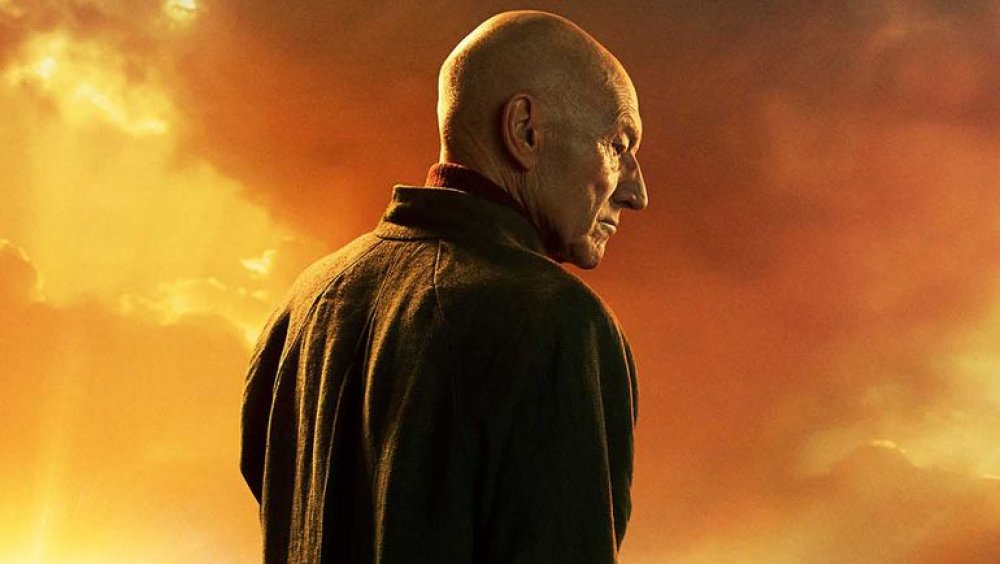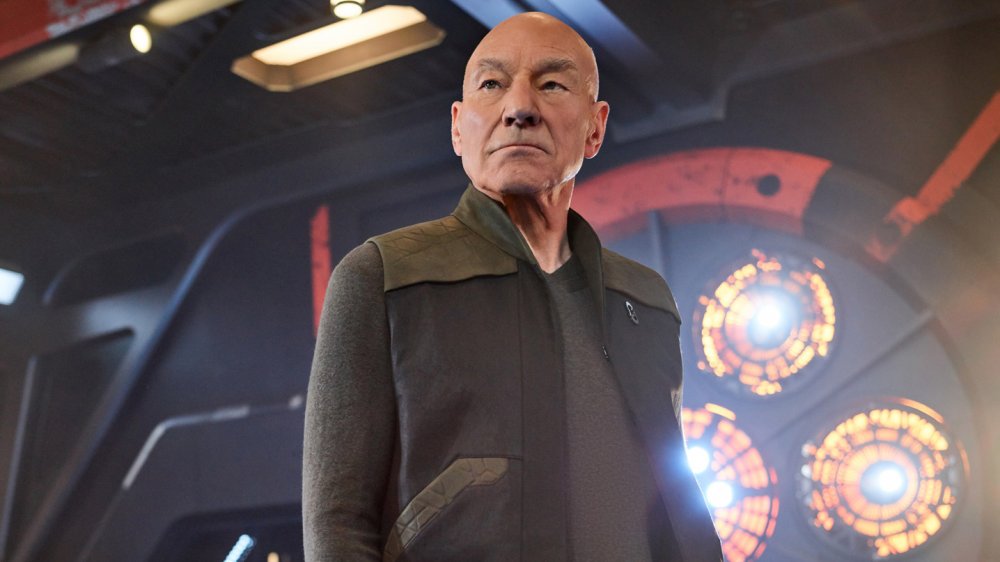What Critics Are Saying About Star Trek: Picard
Star Trek: Picard has engaged on CBS All Access with its first episode, but with the first several installments having been screened for critics, they're already putting pen to paper (or the digital equivalent) to offer up their assessments of the series. Its star Patrick Stewart stated for many years since his last go-around in the role (that being the underwhelming Star Trek: Nemesis in 2002) that he had no interest whatsoever in returning to the character that he is perhaps best-recognized for, so it made quite the news indeed when Picard was announced for CBS' streaming service.
The hype doesn't get much bigger for Star Trek fans — and the accompanying dread doesn't get much deeper, either. It's true that there's a lot to live up to, but fans would do well to remember that Star Trek: The Next Generation, which of course originated the character of Picard, had a few bumps during its storied run — and like all series, Picard may need a little time to breathe and grow.
Overall, though, critical response to the new series is positive and often steeped in a nostalgic kind of relief that a) Patrick Stewart is back on television, and b) that Picard is pretty darn good — if perhaps not for every Star Trek palate. Let's take a look and the good and the bad that critics brought to the fore in their reviews of Star Trek: Picard.
Some critics accuse Picard of draggy pacing
If there's one consistent thing that critics faulted Picard for, it's pacing. Almost every review so far has cited the three-episode stretch that it takes for the series to depart from Earth as being somewhere on the spectrum of tiresome, though many admit that Stewart's gravitas makes the wait worth it. This is partially necessary to catch the audience up on Picard's life post-Nemesis, because the series begins almost twenty years after the events of that film.
Some forgive the lore dump, since the plot also needs time to tie back to the 2009 Star Trek film reboot and its resultant alternate timeline due to the destruction of Romulus (yes, the series intends to operate in that universe and expand the fallout from it) and introduce new characters. That's a lot to accomplish in three hours of screen time.
Some critics were less forgiving than others of the series' lack of action throughout its first three episodes. Entertainment Weekly's brutal review, courtesy of Darren Franich, referred to the show as "talky" and "bafflingly bad," though such a proportion of interactive dialogue (and how effectively it's presented) is often a matter of taste. In this era of television, every program has at least some designs on falling into the "prestige" category, which can often mean less action and excitement in favor of interpersonal tension driving the story through dialogue.
Only the first three episodes of Picard were made available to critics, so it remains to be seen whether subsequent episodes will pick up the pace.
Patrick Stewart is predictably brilliant in the title role of Picard
As one would hope and expect, Stewart is as compelling as ever in the lead, and critics acknowledged it in their reviews. Michael Phillips of the Chicago Tribune summed it up sunnily: "Stewart's just lovely in this," he wrote. "Just as the first round of Star Trek movies, the ones with William Shatner and the gang, made hay on the old idea of old dogs learning new tricks, Picard too has some of that in its synthetic DNA."
So, then, if you are trying not to get your hopes up too high for the series and have settled on simply enjoying more time with Stewart as Picard on your screen, know that much of the television literati feel the same and have been assuaged. On top of that, critics largely praised the inclusion of but non-reliance on nostalgic elements to go with the new setting. Alan Sepinwall of Rolling Stone appreciated the stylistic nods to those veterans returning to the fold: "Despite the cameos and Easter eggs, Picard never feels like nostalgia for its own sake," he opined. "The creative team... have clearly given a lot of thought to the idea of an elderly Picard."
Many of the positive notices were mostly interested in Stewart's performance, both because he is the lead and because his return has a lot to live up to. Some, however, took time to single out Allison Pill's character, a scientist who has lost credibility because of the events that led to Picard's less-than-cheerful retirement, for praise. "You can't have a Star Trek series in the modern age without a few flying fists and explosions," wrote Melanie McFarland of Salon. "[But viewers should see the action] as one of the more invigorating accouterments to the fun... alongside... a wonderful science-driven subplot involving [Pill's] sidelined researcher."
The jury is still out on Picard's first season
The series arrives with a different perspective on Star Trek for a modern age, with a focus on corruption within the Federation and an Earth less idyllic than the one Gene Roddenberry presented to America almost 60 years ago. Because Picard is on a paid streaming channel, this Star Trek curses, and is a little rougher with its violence, too.
These are changes which some longtime fans may have difficulty adjusting to, and while many critics largely find the story's darker, grittier tone balanced against Picard's still-sterling morality, it's not everybody's cup of Earl Grey. "Does anyone want a bitter and brutal Star Trek, full of murder-sorrow flashbacks, swoopy-kinetic fights, and all-encompassing paranoia?" EW's Franich asked in his takedown. "So much of Trek since 2009 strains to resemble the dumbest version of cool."
That's some tough talk, but it's a fair enough point to make for those who have had a cooler response to modern Trek. It's also worth pointing out, though, that Picard sees the former Captain addressing critical mistakes in his career, a conceit which automatically lends itself to a darker story. Danette Chavez of A.V. Club, at least, felt pretty okay with that perspective shift. "Regret is a powerful motivator, and Jean-Luc's list of regrets is nearly as long as his list of accomplishments," she wrote. "But Picard is more opening salvo than it is a requiem for a starship captain."
With many reviewers seeming to withhold ultimate judgment until the arrival of new episodes, Picard has been given a tentative thumbs-up. It'll be interesting to see how the remainder of season 1 builds on the promise of those first three episodes, and we're on board.
New episodes of Picard stream Thursdays on CBS All Access.



